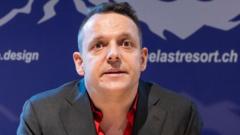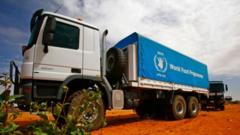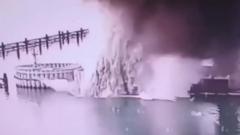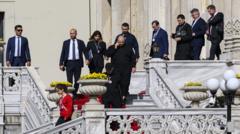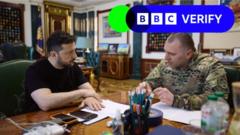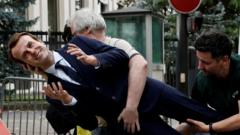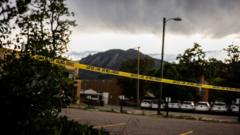General Carsten Breuer emphasizes readiness for a possible Russian offensive towards the alliance's Baltic members, citing a critical buildup of military resources.
**Imminent Threat: German Defence Chief Warns of Potential Russian Attack on NATO**
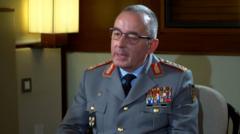
**Imminent Threat: German Defence Chief Warns of Potential Russian Attack on NATO**
With rising tensions, Germany's military leader highlights the urgency for NATO to bolster defenses against Russia's increasing military capabilities.
In a stark warning during the Shangri-La Dialogue in Singapore, General Carsten Breuer, Germany's top defence official, urged NATO member states to prepare for a potential attack from Russia within the next four years. He conveyed this message to the BBC, highlighting that Russia has ramped up its military production to alarming levels, with plans to manufacture hundreds of tanks and substantial artillery munitions each year.
Breuer pointed out that while not all of these military assets are currently deployed in Ukraine, they are earmarked for a significant build-up aimed at confronting NATO's Baltic state allies by 2029 at the latest. "There's an intent and there's a build-up of the stocks for a possible future attack on NATO's Baltic state members," he cautioned, emphasizing the necessity for readiness against a potential strike that might occur even sooner than anticipated.
The German defence chief stated that NATO has cemented its unity on the Ukraine issue, notwithstanding differing views from certain member nations like Hungary and Slovakia. He expressed concerns over the vulnerability of the so-called Suwalki Gap—a critical area bordering Poland, Lithuania, Russia, and Belarus—which he described as a hotspot for potential Russian aggression.
Breuer's comments come at a pivotal time, ahead of the NATO summit in The Hague, where defence budgets will be discussed. He voiced concerns about the extensive military resources Russia controls, including an estimated 1,500 tanks and production of four million rounds of 152mm artillery ammunition expected by 2024.
Moreover, Breuer remarked on the contrasting perceptions among European states regarding the threat from Russia, with Baltic nations being acutely aware of the looming danger compared to Germany's more distanced view. "The Estonians have described it as being close to a wildfire," he said, pointing out the urgency for NATO allies to enhance their military capabilities to bolster deterrence.
Despite the challenges posed by differing opinions within the alliance, Breuer affirmed that NATO remains cohesive, pointing to the rapid inclusion of Finland and Sweden as evidence of collective determination against external threats. He underscored the shift in Germany's approach towards defence, reflecting a broader recognition across Europe of the need to protect NATO's eastern flank in light of Russia's provocative actions.
As the dynamics of warfare continue to evolve, Breuer placed emphasis on the imperative for NATO members to "lean in" by ramping up military investments, recognizing that global security landscapes are shifting rapidly, often outpacing current military preparedness. While Western leaders express readiness, questions linger about their capabilities to match the scale of Russia's military production, especially with the US focusing on commitments beyond Europe.
Breuer pointed out that while not all of these military assets are currently deployed in Ukraine, they are earmarked for a significant build-up aimed at confronting NATO's Baltic state allies by 2029 at the latest. "There's an intent and there's a build-up of the stocks for a possible future attack on NATO's Baltic state members," he cautioned, emphasizing the necessity for readiness against a potential strike that might occur even sooner than anticipated.
The German defence chief stated that NATO has cemented its unity on the Ukraine issue, notwithstanding differing views from certain member nations like Hungary and Slovakia. He expressed concerns over the vulnerability of the so-called Suwalki Gap—a critical area bordering Poland, Lithuania, Russia, and Belarus—which he described as a hotspot for potential Russian aggression.
Breuer's comments come at a pivotal time, ahead of the NATO summit in The Hague, where defence budgets will be discussed. He voiced concerns about the extensive military resources Russia controls, including an estimated 1,500 tanks and production of four million rounds of 152mm artillery ammunition expected by 2024.
Moreover, Breuer remarked on the contrasting perceptions among European states regarding the threat from Russia, with Baltic nations being acutely aware of the looming danger compared to Germany's more distanced view. "The Estonians have described it as being close to a wildfire," he said, pointing out the urgency for NATO allies to enhance their military capabilities to bolster deterrence.
Despite the challenges posed by differing opinions within the alliance, Breuer affirmed that NATO remains cohesive, pointing to the rapid inclusion of Finland and Sweden as evidence of collective determination against external threats. He underscored the shift in Germany's approach towards defence, reflecting a broader recognition across Europe of the need to protect NATO's eastern flank in light of Russia's provocative actions.
As the dynamics of warfare continue to evolve, Breuer placed emphasis on the imperative for NATO members to "lean in" by ramping up military investments, recognizing that global security landscapes are shifting rapidly, often outpacing current military preparedness. While Western leaders express readiness, questions linger about their capabilities to match the scale of Russia's military production, especially with the US focusing on commitments beyond Europe.





